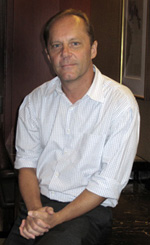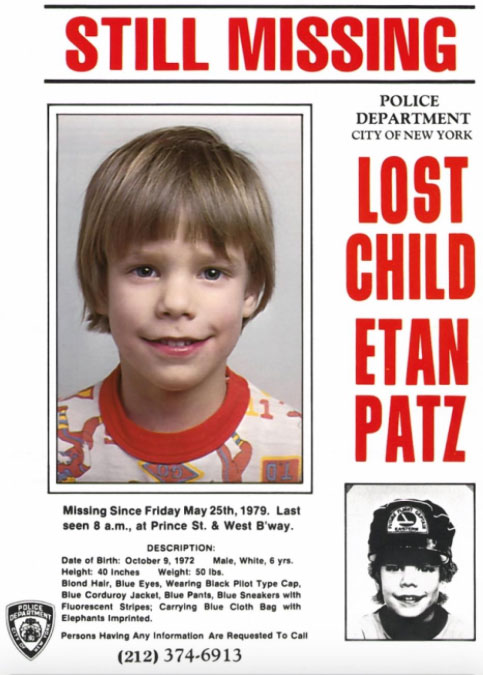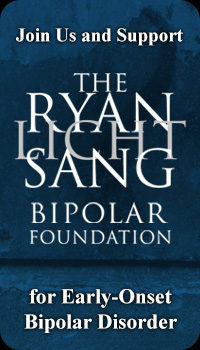

Lost Among the Missing – Etan Patz
By Matt Cutugno
Indio, CA, USA
In 1987, I wrote a monologue entitled "Lost Among the Missing". It concerned one of the lead detectives in the famous case of Etan Patz, a child gone missing in 1979 in Soho, New York. Some five years later, the detective took his own life and his story affected the city nearly as deeply as Etan's tale had years before.
Now the murder case of the poor boy who was legally declared dead in 2001 has finally come to trial thirty-six years after his disappearance.

Matt Cutugno
The Detective:
When you're first assigned, you laugh. It's a relief really, a sigh of relief because you figure now we'll get some action. You're sure that whatever the circumstances might have been now the right man is on the job, pointed questions will be asked and the missing child will be found. You've worked these kinds of crimes. Little Donna disappeared one day as she ran after an ice cream truck, Mitchell vanished on his way to a neighborhood bank to turn in rolls of pennies. You read all the reports and you say this is simple. Whoever was on this case before must've overlooked the obvious. The ice cream vendor, he was the one, or the guy who hung out on the corner near the bank, it was him. With Missing Persons, you approach every case the same way. First you eliminate the obvious, these kids didn't just vanish, there one second and not the next. Something happened, something ascertainable. When you're first assigned you say to the parents, "I have a good feeling." You tell them this with a clear conscience, because my God these children were taken some measurable distance from their homes and loved ones. That distance can be calculated, reasons can be deduced, and that child can be found. You' re on the case, no more some cop who doesn't care, it's me, I have kids of my own, they're grown now but I remember raising them, worrying, waiting up for them to come home. So when you're first assigned you tell the parents they can rest assured.
Then you find out the ice cream vendor has a solid alibi, a legitimate job, no criminal record. He's a working man, he doesn't do things like that, so you pressure him, he takes a lie detector test. He passes, it wasn't him, he knew the little girl, he sold her ice cream. Then the guy who hangs out on the corner near the bank turns out to be homeless, he stays at the men's shelter nearby. People in the neighborhood know him, a local businessman vouches for him, he's a loser, but no kidnapper. You press him anyway, you follow him, the worst thing he does is panhandle. You question him, sure that whoever is capable of taking a child away from family and home, that person has a look in his eyes. But this homeless man doesn't have that look, he looks beaten by life and lost, but that's all.
That's when you worry some. But you say to yourself okay, it's not one of those two, how about some cabbie who if he wasn't a cabbie, would be in jail, how about some out of work short order cook, how about a bag lady who never had any children of her own, how about the kid's uncle, who's a little weird. So you take a deep breath and you roll up your sleeves. Because my God, they have computers with databases, names of no-goods and troublemakers, names of those capable of harming a child. Resources, the police department has resources like you wouldn't believe. Then you add the intangibles, how far you're willing to go, the stuff you know you're made of.
So the computer spits out names and you start checking. Days turn to weeks turn to months. You get addresses, you talk to people, you ask politely, then you get tough, you tell them I want to know where you really were, what you really think, how do you feel about kids, you like them so much you wish you had one, or do you like them so little you'd hurt one? Did you have an unhappy childhood? Did you resent your parents, resent what they made out of your childhood? You lean on people and if you hurt feelings, well politeness doesn't count, you're offended by questions? Tell it to the parents.
Over time you get answers, you check every name on your list, their friends, their enemies, the places they go and the way they act when people are watching and how they act when they think they're alone. You determine these people are liars, cheaters, they're dishonest, they'd break the law if they could get away with it, they'd perform any number of illegal acts, but they didn't kidnap anyone, they do things, but not those things, and so that huge list of names turns out to be just a list.
There's this one case, a special one, and you're working closely with the parents. They're nice folks, New York parents, educated and professional, tough but loving. They like you right off. They like the enthusiasm you show. The kid vanished months ago, they started to give up hope. And you have this honest energy like you believe you can get their child back. What you feel rubs off on them, you can see it in their eyes when you come over, or you hear it in their voices when you talk on the phone. And the enthusiasm feeds off itself, you to them and back to you. "Detective, my husband and I have gone over this before, answered those questions," the mother says. "Answer them for me," you tell her. Her eyes shine and her husband gives a strong handshake and they go over every aspect of the case they've already gone over with other cops.

You're on the case, but at the same time it's on you, and the strain is unbearable. This one missing boy captured the city's heart. The child's name is Ian. You want him back for all the parents of all the vanished and for all the cops who scratched their heads. You want him for the other two children these people have, the missing boy was the youngest. As much as anything you want to know: how did he disappear?
New York loves a melodrama, and they get one.The media feeds the frenzy. This little boy is the first missing child on a milk carton, it was that big. Months pass; you spend more and more time looking for Ian until they officially make it your full time job. You wake up in the morning, have coffee, then work the case until lunch, after lunch work it again. You travel when you have to, make the phone calls you need to. You do it gladly, because you believe. You try to rally people, get them onboard. What you do is create optimism, and you love what you create. You talk to a mystic. Her name is Arlene and she's legitimately gifted, she's worked with the police before, even had an article on her in the Sunday Times. "He wasn't taken far away at first," she says about Ian, "but then he was moved." I let her keep one of his sneakers. She says it helps link her to him. Then weeks pass she says the link is not as strong. You never expected miracles from her anyway. Arlene fades into the background so you move on.
You walk a lot, it seems you walk a lot. Before you started this case you knew New York, thirty years of walking beats, driving squad cars, then unmarked, and it's all the walking that gives you an idea. You get up at six a.m., the same time Ian woke up and you go downtown to his neighborhood and you walk the exact route he walked to school, the same time in the morning. Takes fifteen minutes and after you finish, you decide once isn't enough. The next morning you take the same route, home to school. Ian's walk, past the people he saw that fateful day, past the parked cars, past the store fronts, fifteen minutes in all. And you stop along the way and ask questions to shop owners, pedestrians, bus drivers, neighborhood people, and they say they told the police all they knew, all they saw.
All this time, you have your own family. Four grown kids, two in California, two in the city. One's a cop like her old man, and you talk about Ian, once a week or so. Her name is May and she listens, she says Dad, you're too involved. "There's that line," May says, "the line you told me a cop shouldn't cross during an investigation," and she says you're crossing it. But she has her own life and family, so she doesn't press. You tell your daughter "Honey, give your old man a break, I can solve this, I can find Ian and if I have to get a little crazy, if I have to cross that line I will, I'll step all over that line, I'll obliterate it." Yeah, but your kids have their own lives, so nobody presses. May is right, you are obsessed with the case, but you know that. You dream about a boy you've never met. In your mind are the many photos of him you've seen. You wake up and can actually smell the smell that children have, sometimes you think he's nearby. "He's a regular kid," his mother tells you, and you understand. That's the true reason you want things to turn out right, because Ian is nothing special, just one of God's children. Then one day, many days later, you reach a point. You realize something and you begin to look at the case differently. Whoever did it wasn't sick and impulsive. You theorize a plan to snatch children for sale, strictly business. Ian was targeted. Whoever did it followed him, they were cool, nice, "Your parents sent me," the boy is told, they talk him into a car. They might have even known his name, "You're Ian, right? Your Mom she's waiting for you." He was a trusting kid, he trusted them. You begin to see, supply and demand, children for sale, the thought drives itself home. And that theory makes you sadder, because you wanted to believe you were dealing with an weak individual, you could beat someone like that, but not a business that deals in children like cabbage patch dolls. These thoughts fill your head and you're overwhelmed.
So time goes by as time can go and your relationship with the parents changes. Days drag by with no new leads, just the same old leads. You lose the edge on your enthusiasm and the parents lose the edge on theirs and that makes it lousy. You visit them and there's nothing. "How are you Detective?" they say and you reply, "Just fine how are you?" The parents honestly want to get on with their lives. They would like to forget, not because they didn't love him, but because they did. You remind them of their pain every time they see you.
It's about strain, isn't it? The strain that life puts on you, it pulls at you and sometimes you break. Your children notice, they hear it in your voice, defeat, sadness, then one day you realize that what you're sad about is your own life, you see how the case, searching for this lost child, had given your life a noble meaning. That's the first time you admitted to yourself how sad you were before Ian, and how most of the past five years had been better because maybe you could find him. And May notices and says Dad, how's it going? And you say right as rain. She asks about the case and you talk about the Mets.
Each time the sun rises and another day begins, it reminds you of your failure. Then one day you get a memo to see the captain in his office and in there with him is an Assistant Chief. Captain says hey, Bob, how are ya? You say fine and he says you know Assistant Chief Delaney and you say sure. Delaney nods and you know what's coming. They tell you you've been transferred and the case is winding down. The Captain says the boy is lost and it might be years before any clue is forthcoming. "You're tired, Bob," he says. "We used to see you at Smiley's, you don't come in for a drink anymore, you don't talk with your fellow officers." Then he gets close and lowers his voice and says, "You're in a bad place." The Captain and the Assistant Chief look genuinely concerned. You listen to their words and watch their lips.
After the meeting with your bosses you go for a walk, midtown to downtown, east village to west. You find yourself in Ian's neighborhood of Soho, and you take his walk one more time and you know it will be your last time. You think to yourself, wouldn't it be something, wouldn't it be some kind of irony if a guy called me aside and said hey, you looking for that boy's been lost five years? I know where he is. You begin to convince yourself that it's not too late. Along the walk your heart beats fast, it pounds, and you believe that something wonderful is about to happen, something you've been waiting for your whole life. But nothing happens, and you have an empty feeling.
This case, this famous case, made you briefly a celebrity. Many press conferences early on, then many less. A lost child captured the city's heart and you were front and center. And at first you had that confidence and enthusiasm, it made reporters quote you. "I think he's still nearby," you said and they made a headline out of it. There was the rumor that Ian had been taken to Israel, you flew there, you spoke to many people with accents, but nothing came of it. Then there was the headline in the New York Post "Is This Ian?" It was a picture of a boy who looked like Ian might've looked years later. The photo was discovered in a European gay porn magazine, that made big news, but it wasn't him. After all the headlines, press conferences, mystics, advice from my family, after all that, I'm finished. All I have is the sense of a smell I'm sure he had. I'll never see him, doesn't he know we're looking for him? What the hell is the matter with him, he was seven years old, that's old enough, how could he forget his parents? And the thought crashes: he's dead you old fool, he's been dead, because if he wasn't he would've been in contact, a phone call, a letter, something in five years, whoever had him would slip up.
Who takes children, who are the people that do that? They do it for money, revenge, because they're sick. What kind of people are they? I used to ponder such questions, you do when you're a cop. Those are the questions you start out with, but after all the victims the question is what kind of life is this? And you see the world not as the creation of the Lord but of the Devil.
Life broke me some. My one moment, my chance to prove that good existed turned out bad. I feel sorry for his parents, family, and friends. I feel sorry for myself. I'm alone now, me and my cigarettes, alone together. From here I can look out this window, and see the edge of Brooklyn, and the river, and then Manhattan. It's a hot day, still spring time but the city's hot today. And that's all there is. Except to say that I should care but I don't and that says it all.
Now you leave, because you have something to do, one last thing, and except for that, there's nothing else.
THE END
Link:
Matt Cutugno's Profile at Stay Thirsty Publishing







